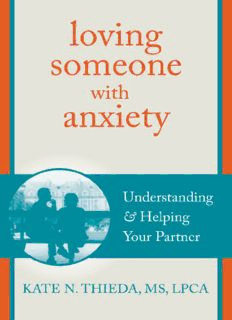
Loving Someone with Anxiety: Understanding and Helping Your Partner PDF
Preview Loving Someone with Anxiety: Understanding and Helping Your Partner
“For the person whose loved one has anxiety, or for the person with anxiety himself or herself, Kate N. Thieda’s book is practical and solution-oriented. Especially reassuring is that the author blames no one, nor does she claim to teach the reader how to ‘fix’ anyone. She offers both understanding of the anxious behavior and tools to change one’s response to it.” — Kristi Webb, PsyD, licensed psychologist, DBT therapist, and a specialist in depression, anxiety, and trauma “As an anxiety disorder specialist, I frequently see my clients’ loved ones at their wits’ end—not knowing what to do, how to help, or how to cope. If your loved one suffers from anxiety, I strongly encourage you to read this book.” — Julie Pike, PhD, licensed psychologist and expert in the treatment of anxiety disorders “This is a very easy-to-read book that provides a clear understanding of the ways that anxiety affects relationships. As Kate N. Thieda points out, good communication is critical in any successful relationship—and especially one that is hampered by anxiety. This book presents readers with important infor- mation on how to use effective communication strategies and other techniques for improving relationships impacted by these problems.” — Jonathan S. Abramowitz, PhD, ABPP, professor and associate chair of psychology at the University of North Carolina (UNC) at Chapel Hill, director of the UNC Anxiety and Stress Disorders Clinic “Countless clients with anxiety ask about a book that will teach their partners about anxiety and offer suggestions for how to help. At last, this is that book! With compassion and practicality, the author offers an understanding of how anxiety impacts a relationship, as well as excellent strategies for how to tackle anxiety and stay strong as a couple. This is a must-get book for anyone loving someone with anxiety.” —Annette R. Perot, PhD, licensed psychologist specializing in the treatment of anxiety disorders “A must-read for partners living with a love one experiencing any form of anxiety! Through both partners’ eyes, Thieda provides robust and engaging content on the common thought patterns, reactions, and behaviors creating anxiety, along with reflective questions, exercises, interpersonal tools, and strategies for supporting loved ones. She skillfully incorporates mindfulness strategies (including affirmation and self-care) as enhancing practices for living in the present moment, dissolving anxiety, and promoting inner calm- ness. Kate’s book is chock-full of helpful examples, insights, and resources for both partners!” —Judith C. Holder, PhD, director at Duke Occupational Mental Health Programs, leadership and life coach-consultant, and author of Mastering Life’s Adventures: On the Beam The Loving Someone Series If your loved one has a psychological disorder, you want to do everything you can to help them feel loved, supported, and safe. However, it’s also important for you to establish personal boundaries so that you can avoid becoming overwhelmed. New Harbinger’s Loving Someone Series was developed to help readers like you truly understand a loved one’s disorder, the medication or treatments that are available, and how to take care of your own needs so that you don’t lose yourself in the process. As the family member or partner of someone with mental illness, you face your own set of unique challenges. Our books can provide powerful, evidence-based tools to help both you and your loved one live happier, healthier lives. For a complete list of books in this series, visit newharbinger.com loving someone with anxiety Understanding & Helping Your Partner KATE N. THIEDA, MS, LPCA New Harbinger Publications, Inc. Publisher’s Note This publication is designed to provide accurate and authoritative information in regard to the subject matter covered. It is sold with the understanding that the pub- lisher is not engaged in rendering psychological, financial, legal, or other professional services. If expert assistance or counseling is needed, the services of a competent profes- sional should be sought. Distributed in Canada by Raincoast Books Copyright © 2013 by Kate N. Thieda New Harbinger Publications, Inc. 5674 Shattuck Avenue Oakland, CA 94609 www.newharbinger.com Cover design by Amy Shoup; Acquired by Melissa Kirk; Edited by Jasmine Star All Rights Reserved Library of Congress Cataloging-in-Publication Data Thieda, Kate. Loving someone with anxiety : understanding and helping your partner / Kate Thieda, MS, LCPA. pages cm. -- (The New Harbinger loving someone series) Includes bibliographical references. ISBN 978-1-60882-611-7 (pbk. : alk. paper) -- ISBN 978-1-60882-612-4 (pdf e-book)-- ISBN 978-1-60882-613-1 (epub) 1. Anxiety. 2. Couples-- Psychology. 3. Interpersonal relations. I. Title. BF575.A6T48 2013 152.4’6--dc23 2012047225 Contents 1 Introduction 1 7 Understanding Anxiety and How It’s Treated 2 33 How Anxiety Affects Relationships 3 61 Typical Responses to a Partner’s Anxiety 4 79 Communication Strategies That Can Help with Anxiety 5 99 Techniques for Reducing Anxiety and Promoting Relaxation 6 117 Responding to Specific Types of Anxiety 7 145 Lifestyle Choices That Can Reduce Anxiety 8 161 Self- Care for the Caregiver 183 Resources 187 References Introduction Loving someone with anxiety can be both tiring and frustrating. It may seem as though no matter what you do or say, it’s never enough to help your partner relax and feel safe. You may find yourself living a lifestyle that you never intended because you’re accommodating your partner’s anxiety. Whether your partner has the kind of “everyday” anxiety that all humans experience or struggles with a diagnosable anxiety disorder, this book can help. Do any of the following situations sound familiar? • Do you constantly reassure your partner that the worst- case scenario is not actually going to happen? • Do you participate in rituals with your partner that seem strange or unnecessary, such as washing your hands a cer- tain number of times a day, arranging items in the pantry or closet “just so,” counting objects or steps, or checking the door locks and windows numerous times before leav- ing the house or going to bed?
Description: